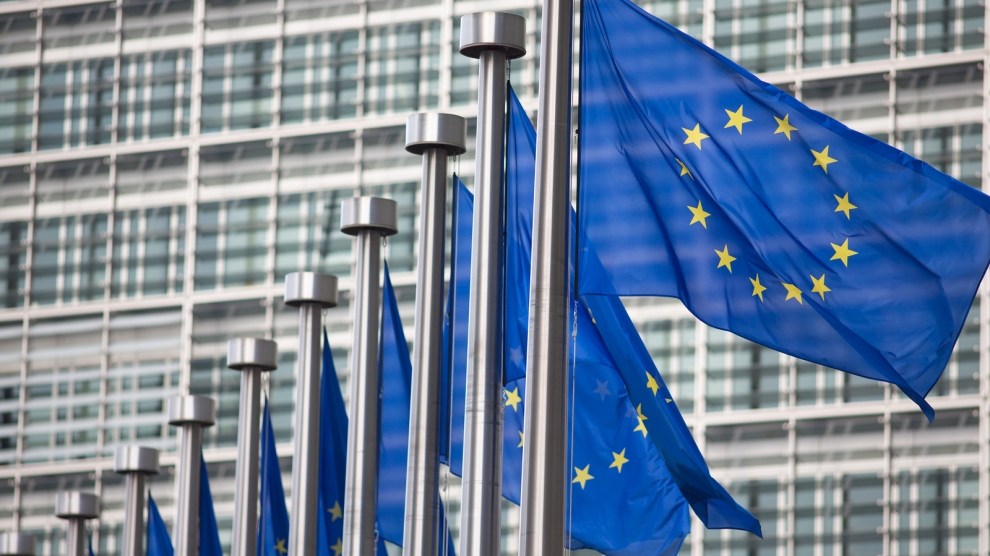BRUSSELS BEHIND THE SCENES
Weekly analysis and untold stories
With SAMUEL STOLTON
Other Brussels behind the scenes stories:
An Ideological War in Ol' Blighty
The curious case of the
Commission President's mobile phones
The German Ministry of Defence likes to erase data.
Commission President Ursula von der Leyen became embroiled in a fresh scandal earlier this week, after news surfaced that information was deleted on a mobile telephone she had been using while working as Defence Minister, before taking up her post in the Commission.
This follows the disclosure of a related story in December, in which German MPs had protested over the deletion of data on another defence ministry handset used by von der Leyen. One Bundestag Member, the Green’s Tobias Linder, had said “we have to assume that people in office destroyed evidence…such actions can have criminal relevance.”
Sent out every Friday afternoon, BRUSSELS BEHIND THE SCENES brings the untold stories about the characters driving the policies affecting our lives. Analysis not found anywhere else, The Brussels Times' Samuel Stolton helps you make sense of what is happening in Brussels.
If you want to receive Brussels behind the scenes straight to your inbox every Friday, subscribe to the newsletter here.
Reportedly, data may have been wiped from both phones in order to stifle an investigation into the signing of lucrative consultancy contracts at the Ministry of Defence. A probe conducted by a parliamentary committee in Germany has been examining whether the signing of such contracts leveraged a network of personal contacts.
Von der Leyen had previously spoken in front of the German Parliament on the matter – admitting errors had taken place that never should have happened. According to Politico, at the time she had put the alleged impropriety down to ‘a mixture of negligence, corner-cutting, and mistakes’ by employees in the Ministry who may have been ‘overworked.’
The crux of the issue is this: Did von der Leyen, in her previous role as German Defence Minister, oversee a department that surreptitiously contracted arrangements with third-party consultancies, on the basis of personal connections? Such questions are likely to arouse fear in those across Europe, who had been promised as part of the German’s Presidency of the Commission, that the EU’s executive over the next five years would usher in a new era of transparency and scrutiny.
“If Europeans are to have faith in our Union, its institutions should be open and beyond reproach on ethics, transparency and integrity,” von der Leyen wrote as part of her European Commission agenda for the forthcoming mandate.
BRUSSELS BEHIND THE SCENES POWERED THIS WEEK BY
Should any further investigation uncover malpractice as the heart of Germany’s Defence Ministry, there will only be more people willing to add their voices to the ever-maddening crowd of those who want the often-shady legislative practices of the European Union to be laid bare for citizens across the continent. And this is an area too in which von der Leyen has made commitments, be however vague they are.
This week should have been draped in wholly more ceremonious robe for the EU executive. On Monday in Luxembourg, the EU27 were sworn in by the European Court of Justice. Members participating in a ‘solemn undertaking’ agreed to abide by the treaties of the EU and the Charter of Fundamental Rights.
“We want to be a more transparent and more accountable Commission, to win more and more the trust of European citizens every day,” von der Leyen said following the swearing in ceremony. “Europe belongs to them.”
Substantiating a sense of ‘possession’ in the hearts of Europeans across the bloc is a formidable task: Not only does one have to tear down the fourth-wall of the Brussels legislative-political enclosure in a spirit of creative transparency, but it then has to make political happenings across the institutions relevant to Europeans – to draw then in, to entice them – not necessarily to please them or patronise them, but to inform them.
For if a population is not informed of the mechanisms by which they are governed, a society ceases to be democratic.
In this regard, the current scandal in which the Commission President finds herself rather intimately embedded, is worrying for the promise of greater transparency in the European Union.
Legacy, or lack thereof, shouldn’t necessarily preclude the capacity of a political leader to radically change the course of their program – and, in this case, von der Leyen should be afforded the liberty to tell us, all of her enduring and persevering European disciples, what precisely went on in the curious case of the Commission President’s mobile phones.
Sent out every Friday afternoon, BRUSSELS BEHIND THE SCENES brings the untold stories about the characters driving the policies affecting our lives. Analysis not found anywhere else, The Brussels Times' Samuel Stolton helps you make sense of what is happening in Brussels.
If you want to receive Brussels behind the scenes straight to your inbox every Friday, subscribe to the newsletter here.


